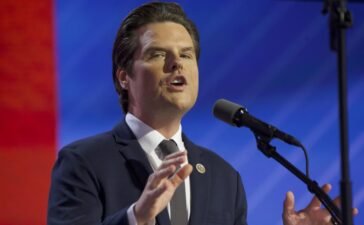
Former TV host Carlos Watson told a jury Monday he never schemed to con backers of his Ozy Media, a once high-flying startup that crashed in a storm of doubt about its business tactics and claims of success.
“Mr. Watson, did you conspire to commit securities fraud?” asked his lawyer, Ronald Sullivan Jr.
“I did not,” Watson said, and repeated it when asked about the other charges against him, aggravated identity theft and conspiracy to commit wire fraud.
Watson, a former news and talk show host on networks including CNN and MSNBC, is the key defense witness in the federal criminal trial surrounding Ozy’s collapse. He and the now-defunct company are accused of giving backers and lenders phony financial statistics, forged contracts and other false information that created a glowing image of a company that actually was on the rocks.
Watson acknowledged that Ozy Media went through cash crunches, but he portrayed them as typical of new companies. He said Ozy’s pitches to and contracts for investors indicated that the numbers could change and weren’t audited.
Those caveats, he said, signaled “buyer beware — startups often don’t work out.”
Ozy disintegrated in fall 2021, after The New York Times raised questions about the company’s audience size claims and practices, particularly a phone call in which company co-founder Samir Rao impersonated a YouTube executive to champion Ozy to some investment bankers.
Watson and Ozy Media have pleaded not guilty and sought to cast blame for any misrepresentations on Rao. He pleaded guilty, testified against Watson and is awaiting sentencing.
Watson, in his first day of testimony, put some distance between himself and the financial nitty-gritty at fast-growing Ozy. He said he focused on its content, vision, staff and partnerships, hosting multiple TV shows, dedicating “a ton of time” to ensuring that its productions and events were high-level, and traveling about four days a week to see key contacts. Rao and others largely took care of technology and day-to-day operations, Watson and others have testified.
“I couldn’t be as hands-on as I probably wanted to be,” said Watson, who acknowledged he had about 301,000 unread email messages as of his 2023 indictment. But he said he tried to give his top executives guidance at meetings that happened at least once weekly.
Prosecutors have pointed to differences between Ozy’s internal records and external presentations to support their allegations that the company was lying to outsiders about its financial straits. But Watson suggested that revenue numbers logged into the company’s main financial software program didn’t reflect all the money coming in.
“Like a lot of young companies, it was kind of incomplete. People were doing the best they could,” but some revenue was logged in other spreadsheets, Watson said.
He also underscored the value of “barter” or “in-kind” revenue and partnerships, such as exchanging Ozy Fest sponsor status for radio promotion. He said Ozy valued such items as revenue by determining what its counterparts would charge for them, and then halving that amount “out of an abundance of caution.”
Former Ozy finance vice president Janeen Poutre testified earlier in the trial that auditors rarely agree to count such revenue and that she didn’t “know where his numbers came from.”
Affable and engaging as he told his and Ozy’s life stories, Watson went through his modest Miami upbringing, his path to Harvard University and Stanford Law School degrees, and a career that ranged from Wall Street to starting and selling a college counseling company to TV. He described brainstorming about what would become Ozy with his mother as she battled cancer in 2012.
“As a Black kid growing up in the ‘70s and ’80s, you wanted to know that the world would have space for your dreams and your ideas and your hopes … and I wanted to create the kind of media that would elevate that,” he told jurors, who watched keenly. Three sat forward in their seats as they appeared to take careful notes.
With “the new and the next” as a catchphrase, Ozy launched a website and newsletters in 2013. Reporters around the world were tasked with finding next-big-things before major media did.
The Mountain View, California-based company eventually added TV shows including the Emmy-winning “Black Women OWN the Conversation” on the Oprah Winfrey Network, podcasts, the Ozy Genius Awards (recipients included poet Amanda Gorman, four years before her celebrated reading at President Joe Biden’s 2021 inauguration) and Ozy Fest, a music-and-ideas festival that was held annually for several years in New York’s Central Park.
“We weren’t like the other new-media companies,” Watson told jurors. “We were more global, we were more inclusive, I think, and we just felt a larger mission.”
The court action got heated later in the day, when U.S. District Judge Eric Komitee sided with prosecutors in a dispute over a document that Sullivan wanted to show jurors. The jurors weren’t in the room for the argument.
“This is a railroad! How can I go forward if I can’t put in documents? I might as well just sit down,” Sullivan exclaimed, then briefly sat in a chair near the podium.
The judge stood by his ruling barring the document. Jurors returned, and Sullivan resumed but reframed his questions about an Ozy fundraising round at issue in the document.
Sullivan later showed jurors other documents related to different aspects of the case.
Prosecutors haven’t yet had their chance to question Watson, who is set to continue testifying Tuesday.






